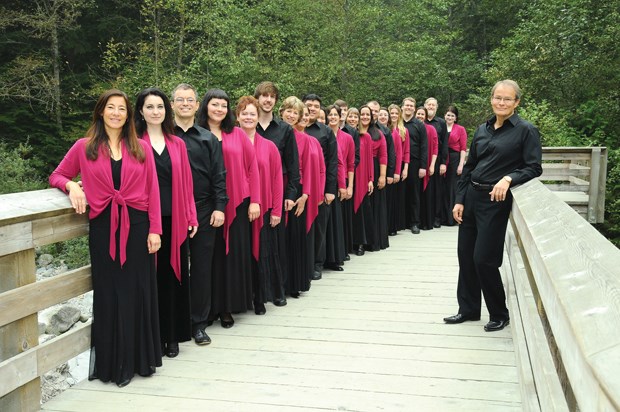Laudate Singers present North American Sound: Gems of Our Time, Saturday, March 1, 8 p.m. at St. Andrew's United Church, 1044 St. Georges Ave., North Vancouver, and Friday, March 7, 8 p.m. at Holy Rosary Cathedral, 646 Richards St., Vancouver. Tickets: $25/$20/$10 at laudatesingers.com or 604-729-6814.
For their next two concerts, the Laudate Singers are looking beyond the heavy-hitting choral favourites of the Renaissance and Baroque periods and will draw on material from modern-day musical masters.
North American Sound: Gems of Our Time shines a spotlight on living composers from Canada and the United States.
Two versions of the concert will be presented: March 1 at St. Andrew's United Church in North Vancouver, and March 7 at Holy Rosary Cathedral in downtown Vancouver.
"I think there's just a lot of fantastic music out there," says the Laudate Singers' artistic director Lars Kaario, describing how he settled on the repertoires. "It's hard to sort of pare it down."
On March 1, the 27-person chamber choir will perform work by American composers Eric Whitacre, Ola Gjeilo and Morten Lauridsen, as well as Vancouver composers Stephen Chatman, Moshe Denburg and Larry Nickel. Two other Vancouver composers, Ed Henderson and Kristopher Fulton, will have new pieces premiered.
The March 1 program consists mostly of traditionally styled choral music, Kaario explains, but the pieces differ widely in harmony and rhythm. The exception is R. Murray Schafer's Miniwanka or The Moments of Water, which Kaario says is "right out there." Written 43 years ago, Miniwanka is the oldest selection on the program but undoubtedly the most "avant garde."
"(Schafer) was really cutting edge, and even today, still very cutting edge."
The Laudate Singers are known for performing music that spans centuries, cultures and genres and Kaario hopes North American Sound will expose both his choir members and choral music lovers to something new.
"I thought it would be great to have our audience hear these pieces, great for the choir to learn them - most of this music is new to us - and it's also a good challenge," he says.
Just because the pieces are all written by North American composers, does not mean they are all in English. The singers have had to master works in Latin, Spanish and even North American indigenous languages for Miniwanka.
The St. Andrew's concert opens with Alleluia (2011) by Eric Whitacre, who Kaario calls one of the most prominent living composers "and a bit of a pop icon too." Whitacre is known for his virtual choir presentations, in which people around the world record videos of themselves singing different portions of a composition, send the recordings to him, and he then compiles the thousands of faces and voices into a single video.
"People are united around the world on this presentation," Kaario says.
Whitacre's most recent virtual choir piece Fly to Paradise features 5,905 singers from 101 countries in 8,409 videos. The sheer number of participants is a testament to Whitacre's large international following, Kaario says.
Although the tradition of choral music in North America is not nearly as long as that of Europe, it was still a challenge for Kaario to whittle down the contemporary North American choral canon into just two concerts.
"The roots are European," he says of choral music, comparing the genre to a pyramid with the European masters at the base and modernday North American composers at the top. "Like learning anything, you take what has preceded you and you study that, you understand that and then from that you create your own language."
The second North American Sounds concert at Holy Rosary Cathedral will feature a different repertoire since the venue permits only sacred music. Here, the Laudate Singers will be joined by church organist Dénis Bedard. The program features works by many of the same composers as the March 1 presentation and will also include the two new commissions.
"It's very important that we're having composers continue to compose," Kaario says, "otherwise the tradition will die and we'll just have all old music, so it's very important to hear new music."



